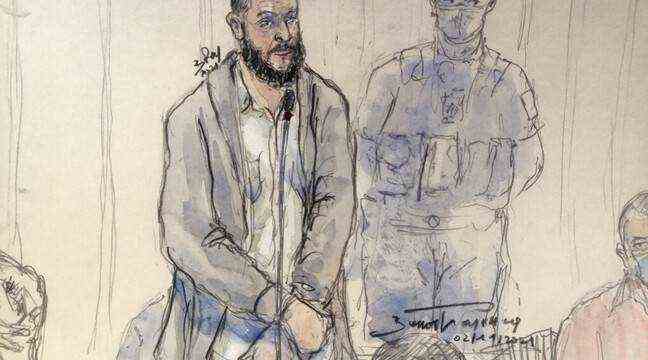At the specially composed assize court in Paris,
On the map projected on the screen, small blue dots crisscross the Molenbeek district. Names have been affixed to the homes of the accused: “Abdeslam”, “Abrini”, “Abaaoud”. Sometimes the dots are almost juxtaposed, others are a block away.
On the occasion of the first interrogations of personalities of the accused at the trial of the November 13 attacks, the court plunged this Tuesday into these streets of the Belgian capital which saw the growth of most of the protagonists of this case. The starting point for many Moroccan families who came to settle in Belgium at the turn of the 1980s, Molenbeek has become the epicenter of the investigation into the 2015 terrorist attacks in Paris and Saint-Denis.
” Everyone knows each other “
“Molenbeek is small, everyone knows each other”, explains the only survivor of the November 13 commandos, Salah Abdeslam. With a calm voice, shaved head and full beard, the accused answered questions from the court for the first time. The fourth child of five siblings, Salah Abdeslam describes “the good atmosphere” which reigned in the family home and which, he assures us, still remains. Having graduated from a technical baccalaureate in electromechanics, he was hired at the age of 18 in the transport company where his father worked. “I took care of the repair of trains (…) I was motivated, I liked to work”, he explains.
But the contract ends after a year. “I was fired,” said the accused. ” Why ? “Asks the president of the Assize Court. “Because I went to prison,” Abdeslam replies. After his first conviction for attempted break-in, the Molenbeekois bought a van, tried to start a transport business. But he stops, for lack of customers. He then launches into the interim: “I had contracts of one month, one week, periods of unemployment. I was doing the yoyo ”. At the turn of the 2010s, he lent a hand to his brother, Brahim Abdeslam, who ran a café in the neighborhood.
With his friends – some of whom are sitting right next to him in the box – Salah Abdeslam “drinks glasses”, “eats at restaurants”, plays soccer, goes out to discotheques from time to time and takes trips to the nightclub. casino. The young man, then a couple, even plans to marry and have children. “When were these projects abandoned? “Asks a lawyer for the civil parties. Abdeslam hesitates, then replies: “When…? From the moment uh … I got involved in doing something else. That is to say, the cases that I am reproached for ”.
“We grew up in a violent world”
On this shift in a radical religious commitment, implied by Abdeslam, the court will not know more. Because this Tuesday and all this week, only the school paths and the family environment of the defendants should be discussed. The supposed radicalization of the fourteen men on trial will be mentioned on the occasion of other interrogations. Mohamed Abrini, Abdeslam’s childhood friend also referred to the Assize Court, however enlightened the court on this subject.
After a “normal childhood” within a family “where we lacked nothing”, Abrini plunges into delinquency at the age of 17, at which age he definitively stops his schooling. Speeding, driving without a license, various thefts, Abdeslam’s neighbor, nicknamed “The Brinks” in the neighborhood in reference to his criminal activities, has a series of convictions and odd jobs. At the time, he says, Molenbeek, “it’s like in the country: in the morning, you go to the shops, the cafes, you have Al-Jazeera on all the TVs. You see war, war, war. Ever since I was little, I’ve only seen that, the Israeli-Palestinian conflict or the US invasion of Iraq ”.
An inveterate gambler addicted to casinos, Mohamed Abrini sees the neighborhood change between 2014 and 2015. When he learns that his little brother has left Belgium to join Syria, the thirty-something is serving a new prison sentence. “No one had any idea what was going to happen. It went very, very quickly. Little by little, people came to tell me that many friends had left or had been killed in Syria (…) I did not understand what was happening there ”. His brother will be killed on the spot. “Devastated” by the news, Abrini “no longer wants to do anything” after his release from prison “other than going to Syria”.
Asked about his “school failure” and his “sporting failure”, the former football player swept aside the hypothesis of a “typical” course for Belgian and French jihadists: “There are people, they have been there. ‘university, they had degrees and they went to war in Syria anyway, that has nothing to do with it ”. One of the magistrates then tries to address her drug use. More tense than his friend Abdeslam, Mohamed Abrini loses his temper and sums up: “I had all the addictions, if you will (…) We grew up in Europe, we did like all young people. We went to discos, we drank, we smoked. We did not come out of our mothers’ wombs with Kalashnikovs in hand. We were children, and we grew up in a violent world ”.

